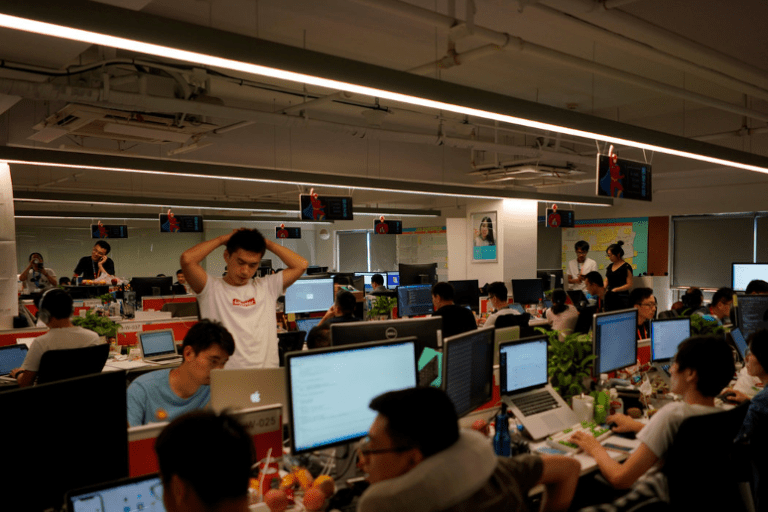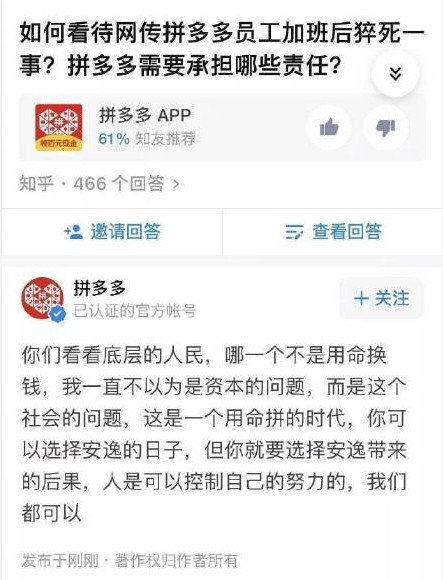 (Credit: Aly Song, Reuters)
(Credit: Aly Song, Reuters)
Earlier this year, two accidents happened at Pinduoduo, a top Chinese e-commerce company. These accidents heated up internet discussions on labor relations.
First on December 29, 2020, a 22-year-old Pinduoduo employee died suddenly in the middle of the night due to overwork.
What made Chinese netizens furious was Pinduoduo’s response to the tragedy. On Zhihu, a Chinese question-and-answer site similar to Quora, a question was posted: “What do you think of the news on Pinduoduo employee’s sudden death after overwork? What kind of responsibility does Pinduoduo need to assume?”
An account labeled as “Pinduoduo (Official)” replied, “Look at the people at the bottom, who hasn’t exchanged their life for money?”
Although this reply was quickly deleted, screenshots were already all over the internet. Later Pinduoduo apologized and claimed it was an accident posted by a non-affiliated marketing agent. But netizens were far from satisfied.
Then on January 9, another Pinduoduo software engineer jumped off his apartment building in Changsha.
These were not isolated incidents.
The scandal didn’t stop there. “A third employee said he had been fired after criticizing Pinduoduo’s work culture” on Maimai, an anonymous company review app similar to Glassdoor.
This series of scandals made people draw the comparison between Pinduoduo and Foxconn. Foxconn is an electronics contract manufacturer that is famous for assembling Apple products.
Around 2010, a string of suicides took place in a Foxconn-owned factory in Shenzhen due to the stressful work environment.
 An assembly bench in Foxconn’s Longhua complex in Shenzhen, China, where iPhones are manufactured. (Credit: Tony Law/Redux/eyevine)
An assembly bench in Foxconn’s Longhua complex in Shenzhen, China, where iPhones are manufactured. (Credit: Tony Law/Redux/eyevine)
Both the assembly line, blue-collar workers and the white-collar tech professionals are under the same pressure. This pressure is caused by unreasonable overwork. It happens regardless of education level or technical skill.
The Dangers of 996 and Involution
In recent years, two words have been discussed over and over again by many Chinese people in their 20s and 30s: “996” and “involution.”
“996” means working from 9 a.m. to 9 p.m. six days a week. This working standard is frequently seen at Chinese tech companies from giant corporations to small businesses. Some white-collar workers even joke about “007,” a new standard working from midnight to midnight all week.
 “Involution” (“内卷” Nèi juǎn)
“Involution” (“内卷” Nèi juǎn)
“Involution” (“内卷” Nèi juǎn) is a word that was first used in anthropology. It was later borrowed by Chinese urbanites to describe the pressure they face in their workplaces or schools.
“Involution” is the tendency for people to make extreme efforts at school or work to compete for limited resources. Yet this kind of involution is sadly fruitless. Returns won’t increase due to a fixed amount of available resources.
 “If you come, we train your kids. If you don’t, we train your kids’ competitors.” This cram school ad perfectly explains the anxiety imposed by involution.
“If you come, we train your kids. If you don’t, we train your kids’ competitors.” This cram school ad perfectly explains the anxiety imposed by involution.
For example, a company is hiring an entry-level salesperson. A high school graduate will be sufficient for the job.
But it turns out that over 50 applicants have applied for the position. Many of them have a bachelor’s degree and are willing to accept the job at the same wage.
Then in the next hiring cycle, the company will expect applicants with higher degrees and lower salary expectations to fill the same entry-level position. This change drives people to compete for college admission as they believe a higher degree will help them better prepare for the job market.
But as more and more people have a bachelor’s degree, the overall standard increases again. Now you need a master’s degree for the same entry-level job that can be done by a high school graduate.
In the “996” context, when a tech company first achieves better outcomes because of its employees’ overwork, other companies follow. But when all the tech companies adapt to “996,” this new standard will eventually cancel out all the comparative advantages the first “996” company had.
To compete with each other, the tech industry now elevates the already morbid overwork culture. The case of Pinduoduo is just another heartrending story of tragedies accumulating from an unhealthy work culture.
Luckily, the Chinese Minister of Human Resources and Social Security shed light on the issue in an announcement in late February. The minister plans to strengthen the labor law enforcement and urge employers to strictly follow regulations on working hours.
It’s unlikely that the tension between employers and overworked workers will vanish anytime soon. But now is the time to start the change.





0 Comments